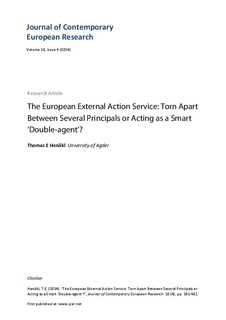| dc.contributor.author | Henökl, Thomas | |
| dc.date.accessioned | 2015-02-04T08:50:59Z | |
| dc.date.available | 2015-02-04T08:50:59Z | |
| dc.date.issued | 2014 | |
| dc.identifier.citation | Henökl, T. (2014). The European External Action Service: Torn apart between several principals or acting as a smart 'double-agent'? Journal of Contemporary European Research, 10(4), 381-401. | nb_NO |
| dc.identifier.issn | 1815-347X | |
| dc.identifier.uri | http://hdl.handle.net/11250/275332 | |
| dc.description | Published version of an article in the journal: Journal of Contemporary European Research. Also available from the publisher at: http://www.jcer.net/index.php/jcer/article/view/605/494 Open Access | nb_NO |
| dc.description.abstract | The European External Action Service (EEAS) is a hybrid and compound institutional actor in the EU’s multi-level administration with delegated authority from the member states (MS) to conduct the EU’s external action. Substantial competences, notably in the field of Neighbourhood and Trade policies, as well as Development and Cooperation remain under the control of the European Commission (Commission). At the same time, also Members of the European Parliament (EP) are more clearly voicing their interests and ownership in the EU’s representation in the world. This article tests the notion of 'double-agent' – or in fact “triple-agent” – as a way of characterizing the position of the EEAS, and in particular of the EU Delegations (as the ‘EU field-level bureaucracies’) vis-à-vis the MS, the Commission and the EP, as an expression of complex and interrelated chains of delegation, where the EU ‘embassies‘ have to interact with and to answer to (but not in a clear line of delegation) different (sets of) principals, namely the MS, the Commission and the EP. Based on the findings from a series of elite interviews with 47 EEAS and Commission officials and on a survey among 184 EU diplomats, the paper seeks to examine this fuzzy principal-agent relationship and uses the review process of the EEAS as an opportunity to assess the level of autonomy of the new EU foreign policy apparatus. | nb_NO |
| dc.language.iso | eng | nb_NO |
| dc.publisher | UACES | nb_NO |
| dc.subject | EEAS | nb_NO |
| dc.subject | EU foreign policy | nb_NO |
| dc.subject | international bureaucracies | nb_NO |
| dc.subject | principal-Agent theory | nb_NO |
| dc.subject | organizational autonomy | nb_NO |
| dc.title | The European External Action Service: Torn apart between several principals or acting as a smart 'double-agent'? | nb_NO |
| dc.type | Journal article | nb_NO |
| dc.type | Peer reviewed | nb_NO |
| dc.subject.nsi | VDP::Social science: 200::Political science and organizational theory: 240::International politics: 243 | nb_NO |
| dc.source.pagenumber | 381-401 | nb_NO |
| dc.source.volume | 10 | nb_NO |
| dc.source.journal | Journal of Contemporary European Research | nb_NO |
| dc.source.issue | 4 | nb_NO |
